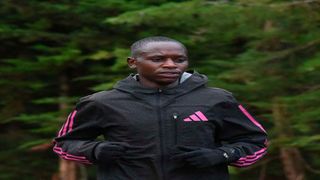
Stanley Rono trains in Iten, Elgeyo Marakwet County on September 8, 2023, in readiness for Berlin Marathon in Germany slated for September 24.
Athletics
Premium
Stanley Rono to set pace in Berlin before 42km debut in Valencia
What you need to know:
- The fact that Eliud Kipchoge, the defending champion, who is also the world record holder, will be competing in Berlin, many are keen to see if he will still lower his own record of two hours, one minute and nine seconds which he clocked last year in the German capital.
Although the elite list for this year’s Valencia Marathon is not yet out, Stanley Rono, who is set to make his full marathon debut in the race, has a big task: Pacing for the second group at the Berlin Marathon on September 24.
The fact that Eliud Kipchoge, the defending champion, who is also the world record holder, will be competing in Berlin, many are keen to see if he will still lower his own record of two hours, one minute and nine seconds which he clocked last year in the German capital.

Stanley Rono and other athletes train in Iten, Elgeyo Marakwet County on September 8, 2023, in readiness for Berlin Marathon in Germany slated for September 24.
And as Rono lines up for the race, he has good memories of pacing the London Marathon last April where he was leading the first group up to the 30-kilometre mark before Kelvin Kiptum went for the prize, becoming the second-fastest of all time when he clocked 2:01:25.
Rono also paced in Valencia Marathon in 2021 where, once again, he paced Kiptum on the latter’s marathon debut and assisted him record the fastest time of 2:01:53 which is now the fifth fastest time of all time.
Rono says that he had trained well ahead of the London race, and that Kiptum had anticipated to run 2:04 but along the way he had a lot of energy and wanted the pace to go up a little bit.
“The pace was good in London Marathon but it suddenly went up and I’m glad that I had done good preparations and I was able to maintain up to the 30km mark where I then dropped out having achieved my target.
“You have to be sharp when you are pacing and be in good shape because anything can happen and you might miss the target,” said Rono.
He said that having reached the 30km mark gave him more reason to continue working hard in training and he believes he is ready for the marathon debut in December.
But first things first: He has to pace well in Berlin next weekend.
The Berlin Marathon will definitely shape him up him to launch his marathon in style.
But, modestly, he maintains that he just wants to “run an impressive race because the marathon has a lot of lessons to offer, especially in the last few kilometres.”
The 26-year-old Rono started competing while in Asis Primary School in Chebarus, Moiben, Uasin Gishu County, and was inspired by his friend Daniel Kipchumba, who trains under the Global Sports Communication team that also handles Kipchoge.
Upon reaching Form Two at Toroch Moi High School in Uasin Gishu in 2016, he dropped due to lack of school fees, but he doesn’t regret doing that because he has educated his siblings from his race earnings.
He stayed at home for two years before he started training again which enabled him to join Complete Sports Athletics Camp in Kaptagat before heading to Ikaika Sports in Iten, Elgeyo Marakwet County, and he is lucky to have competed in various races.
“I have competed in various races and even getting a chance to pace in the Berlin Marathon which is a major marathon race is God’s plan.
“I told my mother that I should try an athletics career so that we can be able to get something better because I had good talent though she had resisted in the first place, but later gave me her blessings and I’m glad my life has changed,” notes Rono.
BIO:
Date of birth: August 8, 1999
Place of birth: Chebarus, Moiben, Uasin Gishu County
Discipline: Half Marathon
Management: Ikaika Sports
Personal best times:
10,000m: 30:20.1
10km: 28:29
15km: 42:44
Half Marathon: 1:00:44
Germany fun facts:
Berlin’s public transport system is widely considered one of the best in the world. With a detailed network of light-rails, trams, subways, regional trains and buses, 7.600 stations allow residents in Berlin to commute and travel eco-friendly and rapidly.
What do toothpaste, fridge, and mp3 have in common? You might use them every day, but do you know who invented them? Yes, they are all inventions coming from Germany!
So do many IT-innovations too. Konrad Zuse invented one of the world’s first computers and it were German researches who invented the chip card as we know it from credit cards, SIM cards and other applications.
Germany is the second largest beer consumer in Europe. Germans usually drink around 2.55 billion gallons of it a year. In Germany, there are over 1,200 breweries that produce over 5,000 brands of German beer. Most German main dishes include meat and sometimes fish - the most popular kinds are pork, beef, veal or fish. The most famous German food exports are sauerkraut, sausages and brezeln (pretzels).
Football has been played in Germany since 1974. The German Football Association is called Deutscher Fussball-Bund or DFB. There are more football fan clubs in Germany than anywhere else in the world.
Germany has only lost a penalty shootout in a major competition once, in 1976. The premier league in Germany is called Bundesliga and includes popular teams such as Bayern Munich and Borussia Dortmund. The German football team has won 4 World Cups, making it the joint-second most successful nation in the tournament.
- Compiled by the Embassy of he Federal Republic of Germany (Nairobi) and Nation Sport




